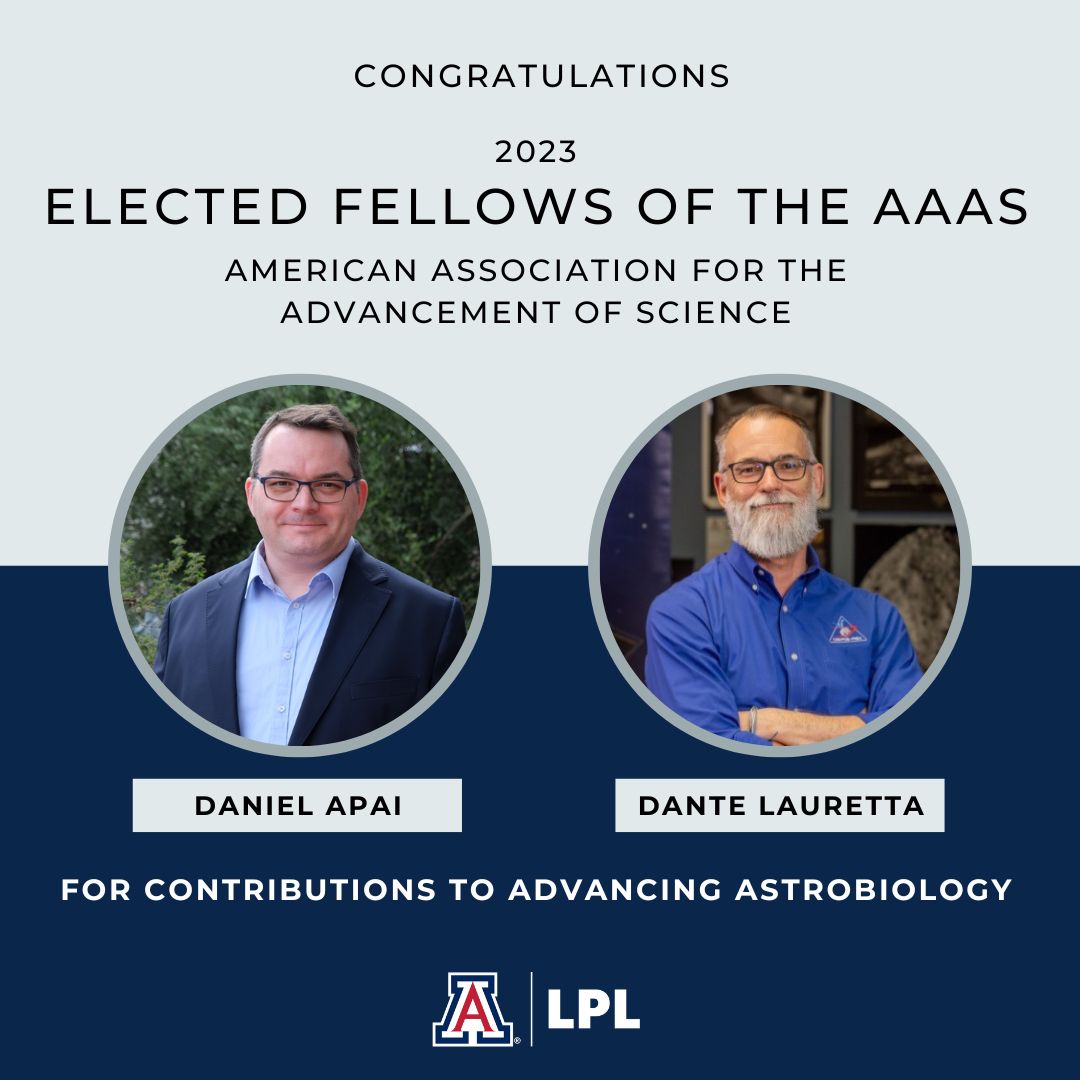
By Niranjana Rajalakshmi, University Communications - April 18, 2024
Two University of Arizona faculty members have been elected 2023 Fellows of the American Association for the Advancement of Science, the world's largest general scientific society, which includes more than 250 affiliated societies and academies of science, serving 10 million individuals.
The newest class of AAAS Fellows, announced Thursday, includes 502 scientists, engineers and innovators, including two UArizona researchers who were recognized for their contributions to astrobiology: Dante Lauretta, Regents Professor of Planetary Sciences in the College of Science and director of the Arizona Astrobiology Center, and Daniel Apai, professor of astronomy in the College of Science .
"I could not be more proud to have two of our star faculty members in astronomy and planetary sciences receive this prestigious recognition," said University of Arizona President Robert C. Robbins. "The University of Arizona has long been a powerhouse in space exploration, and the work of talented faculty like Dante Lauretta and Daniel Apai further cement the university's unrivaled legacy in astronomy, planetary sciences and astrobiology."
The annual Fellows Forum will be held in Washington, D.C., on Sept. 21 in conjunction with the 150th anniversary celebration of the AAAS Fellows program.
"As we celebrate the150th anniversary of the AAAS Fellows, AAAS is proud to recognize the newly elected individuals," said Sudip Parikh, AAAS chief executive officer and executive publisher of the Science family of journals. "This year's class embodies scientific excellence, fosters trust in science throughout the communities they serve, and leads the next generation of scientists while advancing scientific achievements."
Dante Lauretta
Lauretta, Regents Professor at the UArizona Lunar and Planetary Laboratory, has been recognized as a AAAS Fellow for "distinguished contributions to the field of astrobiology, particularly for leadership and advancements through the OSIRIS-REx mission."

Dante Lauretta
"It's quite an honor and I'm super excited – AAAS is a very prestigious organization at the forefront of science and science policy in the United States," Lauretta said.
Lauretta was the principal investigator of OSIRIS-REx, NASA's first U.S. mission to collect a sample from an asteroid. After its launch on Sept. 8, 2016, the OSIRIS-REx spacecraft traveled to the asteroid Bennu, collected a sample from the surface and returned the sample to Earth on Sept. 24, 2023. The sample will help scientists understand more about planet formation and the origin of life on Earth.
"We are getting into the detailed organic chemistry of the samples and really starting to test some of the fundamental ideas surrounding the origin of life," Lauretta said.
Lauretta did his undergraduate work at UArizona, where we earned a bachelor's degree in physics and mathematics from the College of Science and a bachelor's degree in Oriental studies with an emphasis in Japanese from the College of Humanities. He earned his doctorate in Earth and planetary sciences from Washington University in 1997 and worked as a postdoctoral research associate and associate research scientist at Arizona State University prior to joining the University of Arizona as an assistant professor in 2001.
Lauretta is also the director of the university's Arizona Astrobiology Center, which launched in October. The center focuses on astrobiological research on the origins, evolution and distribution of life in the universe. More than 40 faculty members across 13 disciplines from four colleges conduct research at the center.
"A lot of our research involves undergraduate and graduate students," Lauretta said. " We have some of the greatest laboratory instruments in the world for analyzing materials and we are looking forward to new students coming on board to continue this great work."
Daniel Apai
Apai, a professor in the Department of Astronomy and Steward Observatory and the Lunar and Planetary Laboratory and interim associate dean for research in the College of Science, is being honored for his "distinguished contributions to the field of astrobiology and astrophysics, particularly for advancements in understanding of habitable exoplanets and planetary systems."

Daniel Apai
Apai's research is centered around planet formation, planetary atmospheres, exoplanet discovery and characterization. He is the principal investigator of Alien Earths, a NASA-funded astrobiology project that explores the potential of nearby planetary systems for supporting life.
Alien Earths is a multidisciplinary project with 40 members and is one of the largest astrobiology research projects that NASA is funding, Apai said.
"We are integrating knowledge from several disciplines like astronomy, atmospheric sciences, chemistry, material sciences and cosmochemistry," he said. "We made very exciting discoveries."
Apai earned a doctorate in astrophysics from the University of Heidelberg in 2004 and joined the UArizona faculty in 2011.
Apai also leads another project, the Nautilus Space Telescope, in collaboration with colleagues at the UArizona Wyant College of Optical Sciences. Nautilus is a novel space telescope concept that involves the launch of a large fleet of identical telescopes made up of ultra-lightweight optics. The project's goal is to characterize 1,000 potentially Earthlike exoplanets to search for signatures of life.
"We are very close to completing a milestone; we are working on bringing this completely new type of telescope up to Mount Lemmon (north of Tucson) to test it on the sky," Apai said.

